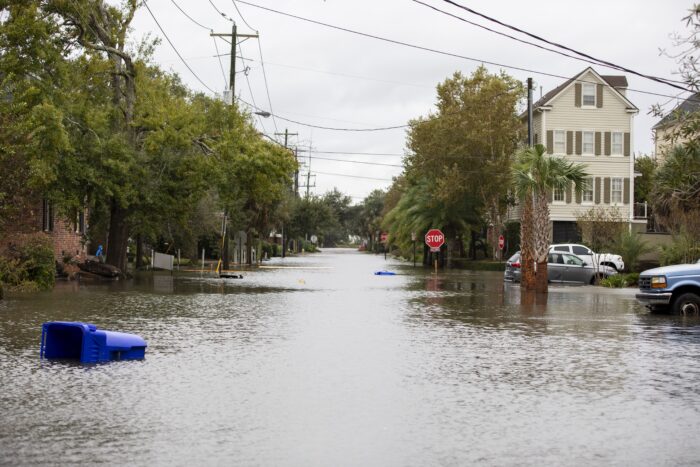What is ‘slab-on-grade’ and why did Charleston just ban it?
Recently, Charleston City Council unanimously passed an ordinance banning “slab-on-grade” foundations in the 100-year floodplain. Whether you live in Charleston or beyond, here’s why it matters for our communities facing climate change impacts.
What is slab-on-grade?
A common building method in the Charleston area, “slab-on-grade” refers to the practice of piling dirt, pouring concrete for the foundation, and constructing the home directly on the concrete slab.
While somewhat cheaper on the front end than other construction methods, the practice involves clear-cutting trees and changing a site’s elevation, which pushes flooding to neighboring areas and disturbs the ecosystem.
We can’t stop Charleston from flooding, but we can stop construction practices that make it significantly worse.
Chris DeScherer, SELC’s South Carolina Office Director
How does it affect our communities?

As Charleston rapidly grows, new developments using slab-on-grade construction exacerbate growing flood risk associated with sea level rise and intensifying storms. Slab-on-grade construction is also difficult to move or alter, which means that it creates expensive barriers to adapting to increasing flooding threats and other changing conditions.
“Slab-on-grade construction in low-lying areas makes the already dangerous problem of flooding worse,” said Jenny Brennan, SELC science and policy analyst.
Use SELC’s Changing Coast tool to visualize rising seas and flood risk in the South.
What is SELC doing about it?
The ban on slab-on-grade foundations passed in Charleston’s City Council after years of partnership with the Coastal Conservation League, Historic Charleston Foundation, and the Southern Environmental Law Center and with support from other local stakeholder groups including the Charleston Trident Association of Realtors, Charleston Homebuilders Association, and Charleston Metro Chamber of Commerce.
“This is a strong start to address the worsening flooding and storms we’re seeing each year,” said Emily Cedzo, Director of Conservation Programs & Policy at the Coastal Conservation League.
The commonsense ordinance will stop slab-on-grade construction, also known as “fill-and-build,” in the 100-year floodplain where houses have a greater chance of flooding each year, preventing the worsening flooding the slab-on-grade causes.
As our communities face rising sea levels and more intense storms, we need to rethink the way we build in vulnerable places. This solution is a step toward protecting our communities from further harm.
Jenny Brennan, SELC Science and Policy Analyst
“It’s a step in the right direction to better protect the Charleston community,” said Cashion Drolet, Chief Advocacy Officer at the Historic Charleston Foundation. “We look forward to seeing what other ways we can work with the city to address worsening flooding.”
Why does it matter?
The ban signals willingness and commitment from Charleston’s City Council to address patterns and risks associated with sea level rise and development related flooding issues. But it also has huge implications for our region.
This historic move could serve as an example for other municipalities to empower and strengthen communities as threats from climate change become more urgent. As neighborhoods along the Southern coast face rising sea levels and stronger storms, the need for policies that require resilient development practices grows.
“The collaboration that led to this commonsense ban on slab-on-grade construction in the floodplain is what’s needed not only to build Charleston’s resilience to climate change, but it can also serve as a roadmap for other cities hoping to tackle the problem of worsening flooding,” says South Carolina Office Director Chris DeScherer.
